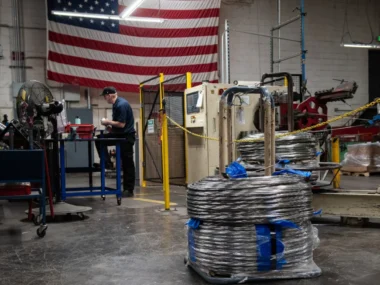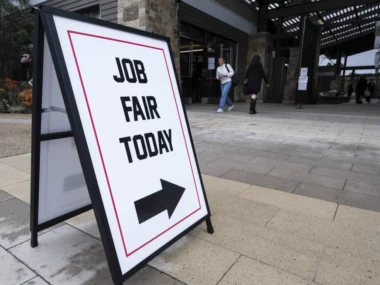Recent data indicates a slowdown in the US economy. June’s jobs report revealed a rise in unemployment to 4.1%, alongside increasing credit card delinquencies and debt. Additionally, consumer spending, which accounts for about two-thirds of the economy, has decreased.
However, investors seem unconcerned. Following the jobs report, the S&P 500 and Nasdaq reached new record highs on Friday. Major indexes ended the shortened trading week higher, with the S&P 500 up 17% year-to-date.
The Federal Reserve’s actions might explain this trend. With inflation and economic growth slowing, potential interest rate cuts could be on the horizon.
Some analysts suggest these figures indicate a return to a pre-pandemic economy, which traders favor.
However, the upcoming US election could bring unexpected changes. President Joe Biden is currently facing tough questions about his reelection campaign.
Before the Bell spoke with Michael Reynolds, vice president of investment strategy at Glenmede, regarding investor reactions, the economy, and the political environment.
Before the Bell: Markets had little reaction to Friday’s jobs report. Did this surprise you?
Michael Reynolds: The market response was minimal because the report continued existing trends, indicating labor market normalization.
The Federal Reserve estimates a “natural” unemployment rate around 4.2% for a stable economy. Starting the year at 3.7%, unemployment has been gradually increasing towards this rate. Some see this as labor market deterioration, but we view it as normalization after pandemic-related disruptions.
BTB: How did the jobs report influence expectations for Federal Reserve rate cuts later this year?
MR: Average hourly earnings are key, especially since the service sector still experiences high inflation and wages play a big role. We saw a 0.3% monthly increase, softer than last month, suggesting positive movement.
We’re not declaring victory over inflation yet, but recent data, like last month’s stable consumer price index, is encouraging.
This week’s CPI report will be crucial. The Fed will closely watch to determine if recent trends continue. We expect two rate cuts this year, with September likely the first opportunity. However, more inflation and jobs data will inform the Fed’s decisions.
BTB: How confident are you about a September rate cut?
MR: September is penciled in, not inked, due to potential changes. Previous false starts in reducing inflation to the 2% target add caution, but this time, the service sector’s decline gives more confidence.
BTB: What’s your view on consumer health and its market impact?
MR: Despite the unemployment rate rise, more people joined the labor force, indicating a healthy sign. However, risks include dwindling pandemic-era savings and rising credit card delinquency rates, which we monitor closely.
Overall, the consumer remains relatively healthy, crucial as they drive two-thirds of economic activity.
BTB: Considering your optimism, how might the market react to significant election news, like reports of President Biden potentially withdrawing from the race?
MR: Markets adjust based on candidate policies over time, but a new major party nominee would accelerate this process, increasing volatility. Markets would need to quickly evaluate candidates’ policies on tax cuts, tariffs, and more, potentially leading to higher volatility leading up to the election.
Diaper change: Japan’s aging society is reshaping the baby care industry.
The global population is aging, a trend the United Nations describes as “irreversible,” driven by longer lifespans and smaller family sizes.
According to a UN report from last year, the number of people aged 65 and older is projected to more than double to 1.6 billion by 2050.
In Japan, this demographic shift is challenging its economy, with an increasing elderly population and a declining birthrate. In early June, Japan reported a record low of 727,277 births in 2023, marking the eighth consecutive year of decline in births since data collection began over 120 years ago.
Earlier this year, Japan revealed that one in ten people are now aged 80 or older, making it the oldest country in the world. Nearly 30% of the population was 65 or older last year.
To address this demographic crisis, Prime Minister Fumio Kishida introduced a multi-billion dollar initiative in June 2023 aimed at encouraging families to have more children. The crisis threatens pension funding and healthcare systems as the workforce diminishes and the elderly population’s needs grow.
This aging population is also transforming the consumer product market. In Japan, the demand for adult diapers is rising, while the demand for baby diapers is falling.
The global market for adult diapers was valued at $12.8 billion in 2023, according to Euromonitor International, and is expected to reach nearly $15.5 billion by 2026. In Japan, the adult diaper market was valued at $1.7 billion in 2023 and is projected to grow to $1.9 billion by 2026, making up over 12% of the global total.
Japanese manufacturer Oji Holdings is an example of a company adapting to this shift. In March, it announced plans to stop producing baby diapers for the Japanese market later this year to focus on adult incontinence products. The company will continue its overseas baby diaper business, which has seen growth in China, Indonesia, and Malaysia, even as domestic sales slow. In 2023, Oji Holdings sold 7.3% more adult diapers than baby diapers in Japan.
Two major amusement park companies have just merged, causing concern among roller coaster enthusiasts.
Six Flags recently completed an $8 billion merger with Cedar Fair, forming the largest amusement park operator in the United States. Together, they manage 42 amusement and water parks across 17 states, as reported by Nathaniel Meyersohn.
Roller coaster enthusiasts are closely monitoring the merger’s impact. Some hope it will lead to improvements in Six Flags’ park conditions, while others fear admission prices may rise.
Amusement park fans, who are passionate about park design and history, often notice even minor changes. Currently, each park will retain its branding and name, but there is concern that the unique nostalgic elements of the parks might be lost, giving way to a more uniform corporate feel.











